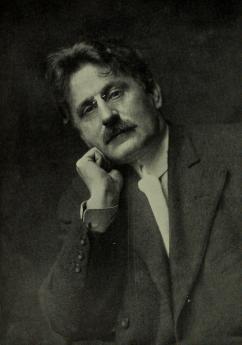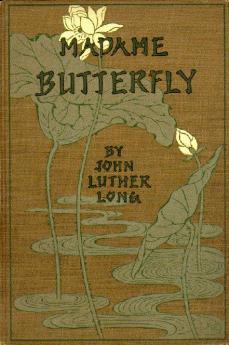Related Topics
Franklin Inn Club
Hidden in a back alley near the theaters, this little club is the center of the City's literary circle. It enjoys outstanding food in surroundings which suggest Samuel Johnson's club in London.
Japan and Philadelphia
Philadelphia and Japan have had a special friendship for 150 years.
Literary Philadelphia
Literary
Favorite Reflections
 In no particular order, here are the author's own favorites.
In no particular order, here are the author's own favorites.
Favorites - II
More favorites. Under construction.
Philadelphia's Fourth Century: Revival or Relapse?
Novelists, sociologists, playwrights, financiers, historians, poets -- and others -- have described and explained the rise and fall of Philadelphia. Each of them is a little bit right, and a little wrong. Philadelphia is hidden, but it isn't hiding.
Madame Butterfly (2)

|
| John Luther Long |
There are two ways of looking at the love affair of Pinkerton, the dashing Philadelphia naval officer, and Madame Butterfly, the beautiful Japanese geisha. John Luther Long wrote about it one way, while Puccini somehow portrays it differently, even though Long collaborated on the Libretto of the opera. Puccini, of course, was himself a famous libertine, tending to follow the typical belief of such men that women somehow enjoy being victimized. Long in real life was a Philadelphia lawyer, trained to keep a straight face when people relate what messes they have got into. If you know the story, you can see Long in the person of Sharpless, the consul. Sharpless is definitely meant to be a Philadelphia name.

|
| Madame Butterfly |
Long was one of the early members of the Franklin Inn, and it is related he wrote much of his successful play at the tables of the club on Camac Street. David Belasco was the "play doctor" who knew how to make a good story fill theater seats. Even after Belasco's polishing, the play came through as a portrayal of the well-born gentleman who had been trained to regard foreign girls as just what you do when you are away from home. His real girlfriend, the beautiful Philadelphia aristocratic woman in a spotless white dress, was the sort you expected to marry. In just a few sentences of Long's play, this woman comes through as just about as distastefully aloof to foreign women as it is possible to be while remaining rigidly polite about it. Butterfly sees this at a glance, knows it for what it is, and knows it is her death. Her duty immediately is "To die honorably, when one can no longer live with honor".
It is Puccini's genius to take this story of how two nasty Americans destroy an honorable Japanese girl and using that same story with the same words, make it into a romantic woman being destroyed by a hopeless, helpless love affair. The power of the music overwhelms the story and sweeps you along to the ending. Even if you feel like Long/Sharpless, dismayed and disheartened by watching some close acquaintances doing things you know they shouldn't.
When Puccini's opera comes to Philadelphia every year or so, the Franklin Inn has a party for the cast, one of the great events of the Philadelphia intellectual scene. Somehow, the full intent of Luther Long's work never seems to come out.